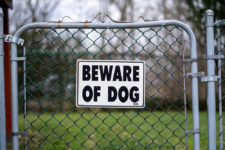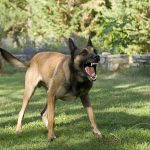The Laws, Defences and Penalties for Dog Attack Offences in New South Wales

A New South Wales Police officer is undergoing surgery after he was attacked by a dog while dealing with a domestic-related incident over the weekend.
Police say when they arrived at the property in Bankstown in south-west Sydney a man had barricaded himself inside the garage with the dog, which subsequently escaped. A woman recaptured the dog, but it mauled the officer’s face as he was trying to speak with her.
Police have alleged that the man commanded the dog to attack, and he has been charged with a number of offences including common assault (domestic violence related), and two counts of setting on or urging a dog to attack or bite.
In 2019, more than 2800 people reported being attacked by dogs in New South Wales. So what does the law say about the liability of owners if a dog attacks a person?
What does the law say about dogs attacking humans?
The Companion Animals Act 1998 (NSW) is the main piece of legislation which deals with animal ownership and control in New South Wales.
Section 16 of the Act deals with the offence of dog attack.
The section prescribes a maximum penalty of $11,000 for owners of dogs that rush at, attack, bite, harass or chase an animal (other than vermin) whether or not any injury is caused and the owner can be prosecuted even if not present when the incident occurred.
However, it is important to bear in mind that a person is not guilty of the offence if the incident occurred:
- as a result of the dog being teased, mistreated, attacked or otherwise provoked, or
- as a result of the person or animal trespassing on the property on which the dog was being kept, or
- as a result of the dog acting in reasonable defence of a person or property, or
- in the course of lawful hunting, or
- in the course of the working of stock by the dog or the training of the dog in the working of stock.
The maximum penalty for a dog attack increases to $44,000 if the case involves a menacing, or a dog that is considered dangerous or a ‘restricted’ dog. In New South Wales, a ‘restricted dog’ is one of the following:
- American pitbull terrier or Pitbull terrier,
- Japanese tosa,
- dogo Argentino (Argentinean fighting dog), and
- fila Brasiliero (Brazilian fighting dog).
Any other dog of a breed, kind or description, whose importation into Australia is prohibited by, or under, the Customs Act 1901 of the Commonwealth (Perro de Presa Canario or Presa Canario).
Any dog declared by an authorised officer of a council, under Division 6 of the Companion Animals Act 1998, to be a restricted dog.
Dog attacks as a result of owner’s conduct
Section 16 (1AA) of the Companion Animals Act deals with dog attacks resulting from owner’s conduct.
If an ‘attack’ is proven to be the result of a ‘reckless act or omission’ by the owner, or by a person in charge of the dog, the maximum penalty is $22,000 and/or 2 years imprisonment where the ‘attack’.
If the attack is by a dangerous and / or restricted dog, then the penalty increases to $55,000 and/or 4 years imprisonment.
If there is a finding of guilt in any scenario where a dog attacks a human, then the owner of the dog can be permanently disqualified from owning a dog. In cases such as this the dog is taken and homed by an animal welfare organisation and will eventually be put down.
The maximum penalty increases to $77,000 if an attack by a dog from the above category is a result of the owner’s failure to comply with the ‘control requirements’ under section 51 or 56 of the Act.
These requirements include keeping the dog in an approved enclosure unless muzzled and leashed in the case of a dangerous dog, or enclosed in a manner that is sufficient to restrain the dog and prevent a child from accessing it in the case of a menacing dog that is not under the effective control of an adult.
‘Encouraging’ the dog to attack
Section 17 of the Companion Animals Act outlines offences where the dog has been encouraged by an owner to attack.
There is a maximum penalty of $22,000 for anyone who ‘sets on or urges a dog’ to attack, bite, harass or chase any person or animal (other than vermin). The Act also gives the Court power to disqualify a guilty person from owning a dog for a specified period of time.
The maximum penalty increases to $77,000 and/or 5 years imprisonment where the person encourages a dog from the above category. Again, the court has the power to determine that a guilty person is permanently disqualified from owning a dog.
Dog attack offences within the NSW Crimes Act
Section 35A(1) of the Crimes Act 1900 (NSW) prescribes a maximum penalty of 10 years in prison for any person who:
(a) has control of a dog, and
(b) does any act that causes the dog to inflict grievous bodily harm on another person, and
(c) is reckless as to the injury that may be caused by the act.
Grievous bodily harm is defined as harm of a ‘really serious kind’, and can include any disfigurement of the face, permanent disability, fractured bones etc.
An ‘omission’ can constitute an ‘act’ for the purpose of the section.
Causing dog to inflict actual bodily harm
Under 35A(2) prescribes a maximum penalty of 5 years in prison for the above offence where ‘actual bodily harm’ is caused.
Actual bodily harm is defined as any injury which is not ‘transient or trifling’, and for example includes significant bruising, cuts and wounds that are not superficial.
Defences to dog attack offences
Legal defences to dog attack offences include:
- Self-defence,
- Duress, and
- Necessity.
Where evidence of a legal defence is raised, the prosecution is then required to disprove the existence of the defence beyond a reasonable doubt.
The defendant is entitled to an acquittal if the prosecution is unable to do this.
Going to court over an alleged dog attack?
If you have been accused of an offence involving an alleged dog attack, call Sydney Criminal Lawyers anytime on (02) 9261 8881 to arrange an appointment with an experienced defence lawyer who will advise you of your options and the best way forward, and fight to achieve the optimal outcome. Together with our head office in the Sydney CBD, we have criminal lawyers in Parramatta, Liverpool, and other convenient office locations across the Sydney Metropolitan area, and beyond.








